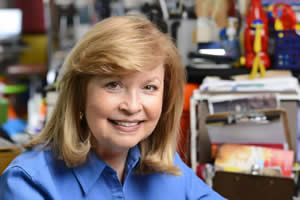 "Keep moving!" That's the advice that Shirley Beck offers people with disabilities. And she demonstrates that mantra every day in her work as a self-employed pediatric physical therapist.
"Keep moving!" That's the advice that Shirley Beck offers people with disabilities. And she demonstrates that mantra every day in her work as a self-employed pediatric physical therapist.
Shirley had already been practicing physical therapy for three years when, at age 26, she was diagnosed with Multiple Sclerosis (MS), an inflammatory disease that affects the nervous system. Even though she was told to "take it easy," she continued working in her field and ultimately formed her own practice that specializes in improving the quality of life for her patients.
Shirley's physical therapy studio is located in her home, where, day to day, she helps infants, children and young adults recover from injuries or improve their movement potential. She specializes in treatment through neuromuscular electrical stimulation and has also authored a book on Torticollis, an asymmetrical head or neck condition that is common in infants.
The primary symptoms of Shirley's MS include mobility issues and spasmodic dysphonia, a type of speech delay. While she can no longer walk unassisted, she leverages a range of devices and productivity enhancements—from a motorized scooter, to forearm crutches, to a home elevator that takes her to and from her studio. She also drives a specially outfitted ramp van, which she says contributes greatly to her independence and quality of life.
Entrepreneurship itself has also added to her quality of life by affording Shirley numerous work-life benefits. For example, being her own boss enables her to set her work schedule to accommodate her own medical and physical therapy appointments. She also has the freedom to "set up shop" in any location — a flexibility she put to use often over the years when her husband's job required her family to move frequently. Her flexible schedule also allows her to pursue her own personal interests such as family time and international travel and adventure, which has included skydiving and bungee jumping. "My disability does not slow me down," she says. And though she recently turned age 65, she has no plans to retire anytime soon!
Many of Shirley's young patients have disabilities as well, and her own experiences with MS help her relate to their emotions and needs. "I tell them my goal is to get them into better shape than I am," she says. "If I can keep moving and do a job I love, so can they."
